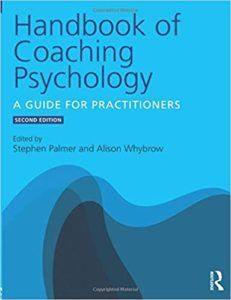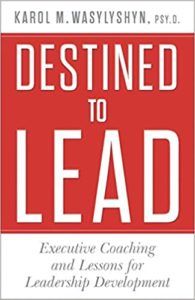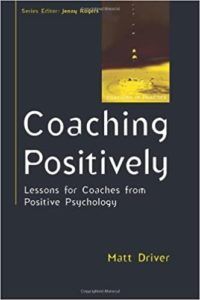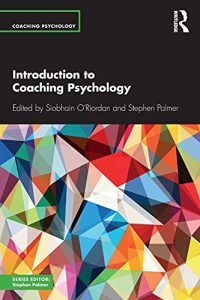Coaching Psychology Defined + Training Options
 Coaching is becoming an increasingly popular field, but the psychological theory underlying it is not fully formed.
Coaching is becoming an increasingly popular field, but the psychological theory underlying it is not fully formed.
Coaching shares many similarities with therapy, which has a much more defined body of literature behind it. Having a foundational knowledge in coaching psychology can make you a more effective coach.
In this article, we will explore coaching psychology and how it can be used to help clients. We will also make useful distinctions between coaches and psychologists, and point those interested in becoming coaches toward resources for their development.
Before you read on, we thought you might like to download three Positive Psychology Exercises for free. These science-based exercises explore fundamental aspects of positive psychology, including strengths, values, and self-compassion, and will give you the tools to enhance the wellbeing of your clients, students, or employees.
This Article Contains:
Coaching Psychology: A Definition
According to Passmore, Stopforth, and Lai (2018), coaching psychology is the scientific study of behavior, cognition, and emotion within coaching practice to deepen our understanding and enhance our practice within coaching.
When you come to the understanding that coaching psychology is the psychology of coaching, it highlights the importance of having a solid foundation in the psychology of behavior, cognition, and emotion. In addition to this academic foundation, the coach must be able to apply what they know in the specific context of their work.
This sounds simple enough, but coaching encompasses such a wide range of activities and theoretical orientations that it can be hard to know where to start learning. As stated above, coaching involves the application of psychological processes, approaches, and interventions to get the client from the starting line to the finish line. But from what part of psychology do these principles originate? What does coaching look like in practice?
Coaching is a facilitative activity. The role of the coach is to guide the client toward their own discoveries, insights, and goals (Passmore et al., 2018). Coaching work focuses on specific goals and measurable achievements, and the client takes a very active approach and the majority of the responsibility involved in accomplishing these goals.
It is difficult to tease apart the practice of coaching from the psychology of coaching. However, having an underlying education in psychology may help the coach understand clients better, enhance their practice, and lead to better outcomes (Passmore et al., 2018).
Because training to be a psychologist provides education in all three of the areas of our working definition (behavior, cognition, emotion), as well as practical experience, the psychologist is well suited in many ways for the transition to coaching work. However, as we will see, there are several significant differences between the coach and the psychologist.
Coach Versus Psychologist

This is an important distinction to make because the regulation of these two words is strict and specific. There is currently no authoritative regulatory body for coaching, and because of this, anyone can set up shop and use the title of coach.
Psychologist, on the other hand, is a term that is regulated by licensing boards. In the United States, for example, no one without a license from a state board can call themselves a psychologist or advertise as such.
In practice, however, there are many overlapping qualities of psychologists (those who practice therapy; to keep things simple, we will call these folks “psychotherapists” from here on) and coaches. This is because there are many similarities between therapy and coaching. In fact, many therapists switch over from therapy to coaching.
To understand the difference between the two titles, it is important to clarify the difference between the two types of work.
Let’s start with some similarities. Both coaching and therapy are based on ongoing, one-on-one confidential relationships between the practitioner and client (Hart, Blattner, & Leipsic, 2001). Clients come into either type of engagement hoping to change, and both coaches and psychotherapists believe that significant change is possible. Without this belief, they would probably not be very effective.
The two disciplines use similar techniques including interviewing, active listening, and Socratic questioning. The psychotherapist and coach both need to build a contextual understanding of the client, maintain a focus on client goals, and facilitate the process of working toward them. Both therapy and coaching involve developmental issues and efforts to build client awareness (Hart et al., 2001).
The main difference between coaching and therapy is the focus of the work. In therapy, the focus is on interpersonal health and an identifiable clinical issue (such as depression or anxiety) that interferes with the client’s functioning (Hart et al., 2001).
The goal of the psychotherapist is to help the client work toward wellness. The process can be wandering and unspecific, leaving space for the client to bring previously unexplored or repressed issues to the forefront of their awareness.
In contrast to therapy, coaching focuses on harnessing untapped potential, helping clients to achieve the goals that they set for themselves. There is no clinical issue in a coaching engagement, and coaches must refer clients to psychotherapists if they detect one. Coaches are more focused on the practical. They help their clients link their awareness to action, taking concrete steps toward their goal with each session.
Another difference between coaching and therapy is that coaches place greater emphasis on the present moment (Hart et al., 2001). Although knowledge of client history is essential to understanding the client in both disciplines, in coaching, the past is visited briefly. In contrast, in therapy, the past is reiterated and analyzed until it is understood.
Speaking of boundaries, coaches do not need to be as strict with clients as psychotherapists. Coaches are free to enter into dual relationships with clients, so long as it does not harm the work (Hart et al., 2001). On the flip side, coaching does not carry the stigma therapy does, and thus clients are more likely to speak openly about their coaching, some even going so far as to brag about their coaches.
The approaches that coaches and psychotherapists take are often very different. Coaches are more likely to be active, informal, and self-revelatory than psychotherapists (Hart et al., 2001).
Psychotherapists are usually more focused on listening, formal, and reserved. The neutrality of the therapist allows space for the client to bring more sensitive issues into the room. However, coaching clients are not usually looking for a neutral observer. They often want a strong and exciting personality who can catalyze them in their pursuit of achievement.
Master’s Degrees in Coaching Psychology
Because an advanced degree is not a requirement for coaching, gaining a master’s degree may or may not be the most effective way to learn about coaching psychology.
That being said, those hoping to become coaches can benefit from graduate training and should have a background in psychology. For those interested in taking an academic route, an undergraduate degree in psychology and a master’s in coaching psychology, organizational development, or clinical psychology can all help build the underlying knowledge and offer opportunities for practical work in the field.
Similarly, a master’s in applied positive psychology teaches the application of positive psychology principles in a format that allows the student to start applying them in practice right away.
For those looking to take an alternative path, gaining firsthand experience in a field or industry of your choosing and then becoming certified through an organization such as the International Coaching Federation can lead to the same career.
Interesting Courses and Training Options

This masterclass is strengths based, grounded in positive psychology theory and takes a four-component approach (strengths, attention, thoughts, and motivation) to help you learn how to maximize your strengths and the strengths of your clients.
The Maximizing Strengths Masterclass consists of a series of video lectures and can be taken at your own leisure.
The Centre for Coaching, located in London, UK, offers a diploma in coaching psychology. The course includes 100 hours of training, with both distance learning and practical components. The program provides education on a wide range of coaching areas, including life or personal, performance, business, executive, and stress management.
This program is only available to those who are already psychologists.
The International Society for Coaching Psychology is a society for the promotion and development of coaching psychology around the world. They arrange seminars and conferences on the topic and also certify different training programs. Here is more information on their approved training programs.
4 Best Books on the Topic
Empower your coaching sessions by reading up on the psychology behind it. These three books are strongly recommended for the practicing coach.
The Handbook of Coaching Psychology: A Guide for Practitioners

It is more of a textbook than a casual read but is a comprehensive text on the topic of coaching psychology. The handbook includes writings that detail the development of the field and provide firsthand narratives of coaching practice.
There are 11 different psychological approaches to coaching in the handbook, including:
- Solution-focused coaching
- Psychodynamic and systems-psychodynamic coaching
- Narrative coaching
- Cognitive-behavioral coaching
Available on Amazon.
Destined to Lead: Executive Coaching and Lessons for Leadership Development

Dr. Wasylyshyn is one of the pioneers of executive coaching work and has written extensively on the topic.
This book shares an intimate look at her approach to working with C-suite-level clients and sheds light on how psychological principles can be combined with business skills to help high-achieving clients succeed.
This book is especially interesting to those looking to go into executive coaching.
Available on Amazon.
Coaching Positively: Lessons for Coaches From Positive Psychology

The book applies six core themes from positive psychology: strengths, mindset, resilience, positive emotions, relationships, and personal growth. It presents real-life examples of how they can be applied in coaching work.
This book will be most useful to those with a background in psychology and a particular interest in positive psychology.
Available on Amazon.
Introduction to Coaching Psychology

Aimed at those new to the field, it covers topics such as:
- coach-coachee relationship,
- coaching psychology models,
- assessments,
- contracting and
- setting up a practice.
This book is recommended as essential reading to anyone new to the field.
Available on Amazon.
A Look at Positive Psychology Coaching
The result of combining positive psychology with coaching psychology is positive psychology coaching. According to Linley and Harrington (2005), the two disciplines fit together well for several reasons.
First, both positive and coaching psychology are focused on the optimal wellbeing of the individual (Linley & Harrington, 2005). Practitioners in both fields agree that psychology has a lot more to offer than helping clients overcome mental illness. Positive psychology coaches help their clients reach higher levels of achievement than baseline functioning.
Second, positive psychology and coaching psychology focus on the positive sides of human nature, challenging the way that practitioners in other disciplines look at human nature (Linley & Harrington, 2005).
Positive psychology coaches look at human nature as neither good nor evil but shaped instead by constructive social forces. They help their clients to recognize and harness the social forces that will help them thrive.
Third, both positive and coaching psychology use a strengths-based approach (Linley & Harrington, 2005). This approach allows for the easy integration of positive psychology in applied coaching practice.
To illustrate what positive psychology coaching skills look like in practice, it is useful to go over Burke’s (2017) conceptual framework for positive psychology coaching. In this framework, positive psychology coaching involves six components.
1. Knowledge
The first component, knowledge, necessitates that the coach has a solid foundational understanding of positive psychology, as well as knowledge about how to apply these teachings in practice.
2. Strengths-based models
The next component, strengths-based models, means that the coach develops an understanding of the client’s strengths and helps them to use these qualities to achieve optimal functioning.
3. Positive diagnosis
The next component, positive diagnosis, is a hallmark of positive psychology and means that the coach focuses on what is going well for the client. This includes resources, behaviors, and habits that will combine to help the client achieve their goals (Burke, 2017).
4. Optimal-functioning goals
Positive psychology coaching pays special attention to the kind of goals that are set for the coaching engagement. In this framework, the coach helps the client to set “optimal-functioning goals.”
These differ from other kinds of goals in that they are set up to help the client achieve optimal human functioning (Burke, 2017). This looks different for each client, but the qualities that they have in common are that they are intrinsic, authentic, approach oriented, harmonious, flexible, and appropriate (Burke, 2017).
5. Positive psychology interventions
Positive psychology coaches use positive psychology interventions. These are activities that enhance positive affect, cognitions, and behaviors (Burke, 2017). A notable type of positive psychology intervention is gratitude work, in which the client is helped to affirm and acknowledge the good things in their life and to recognize that these goods things often come from outside of the self.
6. Positive measures
The last component, positive psychology measures, means that positive psychology coaches assess for positive qualities such as optimism, hope, locus of control, and strengths (Burke, 2017).
Although this component is listed last, measurement can occur at any time during the process, for example, the coach may choose to perform a strengths assessment at the beginning of an engagement. The same measure can be administered several times to track progress.
All six of these components are interactional and reciprocal, and the work is most effective when coaches can switch fluidly between them.
A Take-Home Message
Coaching psychology is a highly practical subsection of psychology that is amenable to a variety of different theoretical orientations.
For those looking to apply psychological knowledge and skill with clients in a nonclinical setting, coaching psychology is a useful area of study. The field is still at its beginning, and formal academic programs explicitly dedicated to coaching psychology are growing in number.
There are also many other kinds of courses on the topic and burgeoning scientific and popular literature in development.
Coaching psychology is a viable area for those interested in helping clients achieve their potential in various sectors including sports, business, relationships, and politics.
We hope you enjoyed reading this article. Don’t forget to download our Positive Psychology Exercises for free.
- Burke, J. (2017). Conceptual framework for a positive psychology coaching practice. The Coaching Psychologist, 14(1), 16–25.
- Driver, M. (2011). Coaching positively: Lessons for coaching from positive psychology. Open University Press.
- Hart, V., Blattner, J., & Leipsic, S. (2001). Coaching versus therapy: A perspective. Consulting Psychology Journal: Practice and Research, 53(4), 229–237.
- Linley, P. A., & Harrington, S. (2005). Positive psychology and coaching psychology: Perspectives on integration. The Coaching Psychologist, 1(1), 13–14.
- Palmer, S., & Whybrow, A. (2008). Handbook of coaching psychology: A guide for practitioners. Routledge/Taylor & Francis Group.
- Passmore, J., Stopforth, M., & Lai, Y.-L. (2018). Defining coaching psychology: Debating coaching and coaching psychology definitions. The Coaching Psychologist, 14(2), 120–123.
- Wasylyshyn, K. M. (2014). Destined to lead: Executive coaching and lessons for leadership development. Palgrave Macmillan.
Let us know your thoughts
Read other articles by their category
- Body & Brain (42)
- Coaching & Application (56)
- Compassion (26)
- Counseling (50)
- Emotional Intelligence (24)
- Gratitude (18)
- Grief & Bereavement (21)
- Happiness & SWB (39)
- Meaning & Values (25)
- Meditation (20)
- Mindfulness (44)
- Motivation & Goals (43)
- Optimism & Mindset (32)
- Positive CBT (25)
- Positive Communication (20)
- Positive Education (44)
- Positive Emotions (30)
- Positive Leadership (13)
- Positive Psychology (32)
- Positive Workplace (33)
- Productivity (16)
- Relationships (42)
- Resilience & Coping (34)
- Self Awareness (20)
- Self Esteem (36)
- Software & Apps (22)
- Strengths & Virtues (30)
- Stress & Burnout Prevention (33)
- Theory & Books (44)
- Therapy Exercises (35)
- Types of Therapy (58)



What our readers think
I am studying to become a Behavioral Assistant, and I am interested in becoming a psychologist coach. Where can I do the trainings?
Hi Vanusa,
That’s great! Becoming a psychologist has quite different requirements than those for becoming a coach. You can learn more in our dedicated blog post: https://positivepsychology.com/how-to-become-a-therapist/
Alternatively, consider taking a look at our guide ‘On Becoming a Therapist’: https://tools.positivepsychology.com/17-becoming-therapist-ebook
Hope this helps!
– Nicole | Community Manager
Hi:
I am a licensed psychologist in California and I am interested in providing coaching services. Do you offer hourly consultation on starting coaching? Thank you. Anindita
Hi Dr. Anindita,
I’m afraid we don’t offer consultation services here. However, if you’re looking for other avenues, perhaps you could reach out to the International Coaching Federation. I suspect they’d be able to make a recommendation or point you toward someone who could help.
All the best!
– Nicole | Community Manager
Is there other coaching psychology degree other than in Sydney uni?
I am curious to know more about how much coaching is related to cognitive behavior approach / therapy
Hi Banan,
I think the coaching psychology degree on offer at the University of Sydney is a bit of a rare gem as I cannot find any other degree programs of this nature. While this may change in the future, according to this website, certification from an ICF accredited institute is generally the way to go if you’d like to become a coach.
As for your second question, there is a lot of overlap between the principles used in coaching and CBT. For instance, coaches might encourage their clients to think about their circumstances differently, such as by using cognitive restructuring. However, there’s a line between coaching and the clinical support provided by therapists that limits the kind of work that a coach is ethically allowed to undertake.
I hope this answers your question!
– Nicole | Community Manager
Hi,
There are some coaching psychology degrees. Sydney uni runs a masters of science in coaching psychology. I think there are a number of coaching psychology departments around the world now.